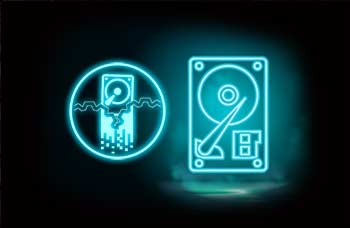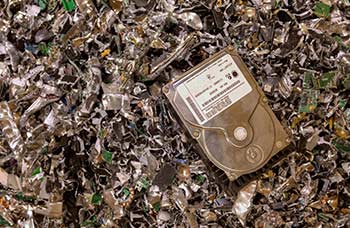
Ordinarily, businesses spend fortunes ensuring their data is safely backed-up and never deleted. It’s only after a computing device reaches the end of its usefulness, and is scheduled for recycling, that deleting data comes into focus. As any IT manager worth his salt will tell you, failing to wipe a hard drive clean of data before recycling it, reselling it or returning it to a leasing company can result in catastrophic consequences. For example, if you dispose of a work computer that contains personal information it can lead to crimes such as identity theft. Of course, a failure to delete business data can also result in business-critical and utterly devastating data breeches. Perhaps worse still, failure to delete personally identifiable information (PII) from your business computers, laptops, servers, Android and Apple devices can result in massive fines and even imprisonment.
In the United States, no single Federal law regulates the protection of ‘personally identifiable information’ (PII). Instead, personal data protection rights are supported with a wide range of different consumer protection laws. An example of which is the Federal Trade Commission Act (FTC Act), which is often used to prohibit the disclosure of PII. Another example is the HIPAA Privacy Rule which really sets the national standards to protect individuals' medical records and other personal health information. The list of ‘data protection laws’ are numerous but failure to comply with just one can be career ending.
Unfortunately, simply pressing the delete key and formatting the disk is not enough to permanently remove information from your old office computers hard drives or server storage systems. Deleting a file doesn’t really delete it. All that really happens when you press delete is the path to the file is removed so you can’t see it in its folder anymore. This means deleted files are simply hidden, and in fact still fully recoverable. There are only two ways to permanently scrub files from a hard drive. The first method is to overwrite the file with other data and the second method is to physically destroy the hardware.

Destroying the hard drive is the fun bit, we get to look at EMP’s, crushers, cutters and shredders. However, believe it or not, overwriting data still remains one of the most secure data destruction methods. Every World Power insists their military and intelligence gathering agencies all wipe their old hard drives with anywhere between 3 to 35 overwrites before disposal. The DOD for example runs a 3-pass overwrite as standard, however after this it’s still possible to recover data from a hard drive using “magnetic force microscopy”. A 7-pass erasure using random data to overwrite deleted files does the trick though and makes file recovery an impossibility. YBC calls this a forensic hard drive scrub and as far as data wipes go it’s one of the best ways to degauss any type of hard drive.
Hard disk wiping might be the best method but it takes time, especially if you are wiping Tbits of data. By far the fastest way to wipe a hard disk drive is to perform an electromagnetic disk wipe. Using an incredibly powerful electromagnetic field polarizes all of the disks magnetic data, in essence destroying everything in a few seconds. This is a great solution on conventional disk drives but it doesn’t work for solid state drives (SSD). SSD computer, laptop, tablet and smartphone memory can only be wiped by either overwriting data or by crushing / shredding it.
The YBC ITAD data destruction service provides every level and every type of data deletion. YBC offers onsite hard drive shredding for those clients with large quantities of hard drives and a high need for security. In addition, YBC has its own dedicated data destruction centers that can wipe and destroy your company’s old hard drives to the standards that surpass even the most rigorous legal legislations. When you recycle your old computers, laptops, servers, pc tablets and mobile phones with YBC you are legally protected against hard drive data breeches. For help with becoming a client or more information about the YBC ITAD data destruction services please call 908 431 0090 or Email Us or use the form below:
How you dispose of a desktop computer’s hard drive can be very different to how you dispose of a laptop’s hard drive. Not wishing to add further complications but how you dispose of an office pc hard drive can also be extremely different to how you dispose of an Android or Apple mobile device’s hard drive. Most business desktop computers and server storage systems use a memory storage device known as a hard disk drive (HDD). The HDD gets its name because it has a hard metallic like disk being driven around inside it. It’s as easy as that. However, most mobile phones, computer tablets and an increasing number of laptops use a solid-state drive to store their digital data. There are physical and technical differences between the two ‘storage systems’ that can affect the disposal process. For example, if the HDD is subjected to a powerful enough magnetic field all of its data is permanently wiped and the drive is destroyed. This is because an HDD stores and reads digital data on its disk using a magnetic read / write technology. However, an SSD is not always wiped by electromagnetic fields (magnets) because it writes and reads data differently. With an SSD the data is stored as electrons in a way that magnetic polarization can’t really affect it. With all their differences both storage devices can be made ready for disposal very simply by performing a data wipe. This process simply writes data over the original data stored on the hard drive enough times to ensure it can never be recovered. Alternatively, you can have both HDD and SSD physically destroyed by having them crushed, cut up or shredded though this can have a slightly higher cost to it. The YBC ITAD computer recycling and data destruction service has been especially designed to help your business dispose of it’s old hard drives securely and legally. If you need help wiping, shredding or recycling hard drives that you need to dispose of please call 908 431 0090 or Email: info@ybc-itad.com.
These are the top 3 best ways to permanently delete files such as documents, pictures, movies and data from pcs, laptops and mobile phones. 1. Use ‘File Shredder’ software apps to remove any trace of your deleted files by permanently overwriting them. 2. Physically remove your hard drive and have it crushed, perforated and cut. 3. Drop your company hard drives, mobile phones and computer tablets into a NAID certified hard drive shredder. The YBC ITAD data destruction and computer disposal service provides’ all three methods for permanently removing files and data from the memory of pcs and mobile devices. If your business is recycling or looking to dispose of its retired phones, laptops, computers and even server data storage systems call YBC today for help: 908 431 0090 or Email info@ybc-itad.com.
If your company is looking to permanently delete files and data from Android and Apple tablets and phones you have to first ask the following 4 questions. 1. Are you going to be recycling your company Android and Apple tablets and phones? 2. Are you going to be selling your company Android and Apple tablets and phones? 3. Are you going to continue using your company Android and Apple tablets and phones? 4. Is your business looking to donate used Android and Apple tablets and phones? If you’re just looking to dispose of your Android and Apple tablets and phones by having them recycled then the best way to destroy their hard drives is simply to have their memory wiped or to have them shredded. If you want to keep your old, used Android and Apple tablets and phones in a useable but data safe state you’ll need to have their drives wiped. Wiping the memory used in Android and Apple tablets or smartphones is best achieved using software to overwrite all the data stored on it. The problem with wiping a computer tablets or mobile phones memory is you will have to reinstall the mobile devices operating system afterwards.
There are 3 ways to recycle a hard drive. Firstly, your company can have the hard drive crushed or shredded. The remaining pieces of the hard drive are roughly separated out into alloys and plastics. These materials are then refined further until they can be reclaimed either chemically (dissolving and electrolysis) or via smelting or melting. Secondly, you can recycle a hard drive via a process known as de-manufacturing. The de-manufacturing process is simply taking apart the hard drive using tools and manually sorting its circuit boards, metals and plastics so they can be recycled more easily (and with less waste). Thirdly and finally, you can securely dispose of old hard drives by having them wiped, refurbished and either resold or donated. In fact, reuse is considered one of the best ways to recycle and providing your ITAD provider has properly wiped your hard drives there are no legal ramifications with this disposal process.
Hard drive wipes are considered to be the securest method of data erasure available. There are no remaining fragments of a hard drive, no possible ways to recover deleted data and no traces of files, folders, documents and digital information. Furthermore, it leaves the hard drive intact and capable of being redeployed if need be. A hard drive wipe is achieved by overwriting the existing data with random data. Writing over the data is known as a ‘pass’. The number of passes refers to the number of times the data is overwritten. For example, a 7-pass data wipe means that the information on your old hard drive was written over 7 times. This has the effect of clearing away the previously existing data and making it impossible to recover. The standard number of overwrites ranges from 7 passes to as many as 35 overwrites (passes).
Providing the hard drive shredder is well maintained and continues to shreds the memory drives into fine flakes it remains one of the most effective methods of data destruction. Ware and tear on the hard drive shredder can result in expensive refurbishments making hard drive shredding one of the more costly ways to dispose of your company hard drives. Many data centers employ ITAD companies to provide on-site hard drive shredding services. On-site data storage drive shredding (also known as onsite hard drive shredding) is where a mobile hard drive and media destruction vehicle is deployed to your business location. Your data storage devices are then shredded immediately before leaving your location to be recycled. It is one of the most secure ways to ensure all data is destroyed before the hard drives leave the premises.
It is extremely important to dispose of your company hard drive correctly. Failure to dispose of company hard drives correctly can result in heavy fines and even imprisonment. Places that offer hard drive and computer disposal should be certified computer recycling and data destruction facilities. The YBC ITAD computer recycling and data destruction program has been designed to help businesses dispose of their hard drives legally. For more information, please contact the YBC ITAD hard drive disposal department.
The YBC ITAD computer disposal and data destruction service removes and recycles retired office printers, company phones, business tablet computers, office PCs, corporate laptops, desktop computers, servers and IT hardware. Call the YBC ITAD Pick-Up and Disposal Team for help: 908 431 0090 or EMAIL YBC or use the form above CLICK HERE